|
|
|
Sort Order |
|
|
|
Items / Page
|
|
|
|
|
|
|
| Srl | Item |
| 1 |
ID:
080306
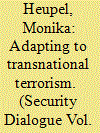

|
|
|
|
|
| Publication |
2007.
|
| Summary/Abstract |
During the 1990s, and particularly since 9/11, state-sponsored terrorism gradually declined, while transnational terrorism, which largely operates without direct state support and features cross-border network structures and a greater propensity to mass-casualty attacks, has gained in importance. Setting out from this observation, the purpose of this article is to examine whether the UN Security Council (SC) has adapted to transnational terrorism and, if so, how. Providing a systematic and theory-guided comparison of the SC's approach to these different types of terrorism, the article shows that, contrary to common considerations, the SC did adapt to transnational terrorism. The SC applied sanctions against terrorists and committed every state to instituting far-reaching generic counter-terrorism measures. Moreover, in an unprecedented way, it made use of managerial compliance strategies to foster implementation. In this way, the SC adapted to transnational terrorism by demanding more from states and intervening deeper into their domestic realm, while at the same time offering more support with respect to implementation. While such an approach is unlikely to become common SC practice in the short term, it is nevertheless symptomatic of a broader trend in the evolution of governance patterns in the post-national constellation today
|
|
|
|
|
|
|
|
|
|
|
|
|
|
|
|
| 2 |
ID:
106026
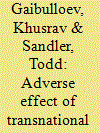

|
|
|
|
|
| Publication |
2011.
|
| Summary/Abstract |
This article investigates the adverse effects of domestic and transnational terrorism on income per capita growth for 51 African countries for 1970-2007, while accounting for cross-sectional (spatial) dependence and conflict (i.e. internal conflicts and external wars). The findings of the fixed-effects panel estimator suggest that transnational terrorism has a significant, but modest, marginal impact on income per capita growth. These results hold for two different terrorism event datasets. However, domestic terrorist events do not affect income per capita growth. Our findings differ from those in an earlier study on the impact of transnational terrorism on African growth, because we uncover a much more moderate effect. In our study, regional impacts and terrorism-conflict interactions effects are also distinguished. Moreover, our sample countries and period are more extensive. Our article contains a host of robustness checks involving macroeconomic and political variables that find virtually identical results. Alternative terrorist variables are also used, with little qualitative change in the findings. The absence of a domestic terrorism impact is surprising because there were many more domestic than transnational terrorist incidents in Africa. To promote growth, host and donor countries must direct scarce counter-terrorism resources to protect against transnational terrorism in particular. The modest impact of transnational terrorism on African growth means that developing countries' economies have been more resilient to terrorism than has been generally thought.
|
|
|
|
|
|
|
|
|
|
|
|
|
|
|
|
| 3 |
ID:
152711
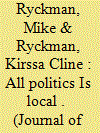

|
|
|
|
|
| Summary/Abstract |
Transnational terrorism is a complex, multinational phenomenon, and the transnational terrorism literature has increasingly turned to a dyadic research design in order to better capture these complexities. However, existing dyadic data tend to be proprietary or limited in scope, resulting in barriers for replication and generating new research. Toward that end, we develop a method to generate a dyadic transnational dataset using the publicly available Global Terrorism Database (GTD). The method is based on the premise that terror groups have a domestic agenda that is tied to a “home” state, which can be discerned based on the group’s patterns of attack. Dyads can then be constructed, where one side is the terror group’s home state and the other side is the target state, defined both by location of attack and the nationality of victims. To illustrate the utility of the data, the “logic of home” is applied to the question of transnational target selection. We replicate existing findings that examine the effect of troop deployments on the likelihood of transnational terrorist attacks, finding that troop deployments increase the likelihood of attacks against nationals of the deploying country. We further explore the effect of third-party support to the government side of a civil war, and find that intervention increases both the likelihood of attacks against nationals of the third-party intervener as well as attacks on the home soil of the intervening state.
|
|
|
|
|
|
|
|
|
|
|
|
|
|
|
|
| 4 |
ID:
128871


|
|
|
|
|
| Publication |
2014.
|
| Summary/Abstract |
This article presents an eclectic review of the analytical study of terrorism that views all agents as rational decisionmakers. This analytical literature began in earnest with the seminal study of US skyjackings by William Landes in 1978. After 11 September 2001, the analytical literature on terrorism grew rapidly. Based on policy relevance, my survey article identifies five key areas of intense research interests. These include analyses of terrorist attack trends, the economic consequences of terrorism, the study of counterterrorism effectiveness, the causes of terrorism, and the relationship of terrorism and liberal democracies. New developments in the field focused on distinguishing key differences between domestic and transnational terrorism. Additionally, recent game-theoretic advances permitted more active agents and stages to the games. Other major developments involved the study of networked terrorists and the role of counterterrorism foreign aid. Fruitful future directions include using advanced econometric methods to discern the true impact of terrorism on growth, applying spatial econometrics to the study of terrorism, ascertaining the determinants of terrorist groups' longevity, and learning how to foster international counterterrorism cooperation.
|
|
|
|
|
|
|
|
|
|
|
|
|
|
|
|
| 5 |
ID:
029811
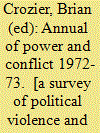

|
|
|
|
|
| Publication |
London, Institute for the study of conflict, 1973.
|
| Description |
x, 174p.
|
|
|
|
|
|
|
|
|
|
|
|
Copies: C:1/I:0,R:0,Q:0
Circulation
| Accession# | Call# | Current Location | Status | Policy | Location |
| 012979 | 327.16/ANN 012979 | Main | On Shelf | General | |
|
|
|
|
| 6 |
ID:
080899
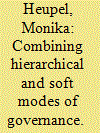

|
|
|
|
|
| Publication |
2008.
|
| Summary/Abstract |
In the wake of 9/11, the UN Security Council (SC) set out to urge every UN member to strengthen its domestic capacity to counter transnational terrorism and the heightened risk of weapons of mass destruction (WMD) proliferation to non-state actors. This article examines the modes of governance the SC applied - in terms of both setting and implementing rules - to influence states' activities in response to these two security threats. The far-reaching, generic, legally binding obligations imposed on every UN member were unprecedented and indicate a `hierarchical' approach. Yet, the SC - partly deliberately, and partly out of necessity - drew extensively upon a range of `soft' governance modes to support implementation and enhance the legitimacy of its approach. It remains to be seen whether this approach will be the precursor to a future trend. However, its usefulness will depend on whether the SC members will come to an agreement on how to implement `legislative' resolutions, and whether non-Council members will be granted greater influence in SC decision-making. Although more empirical research is needed on the SC's application of different modes of governance, these results contribute to a better understanding of the use of governance modes by international organizations other than the European Union
|
|
|
|
|
|
|
|
|
|
|
|
|
|
|
|
| 7 |
ID:
102520
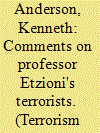

|
|
|
| 8 |
ID:
174713
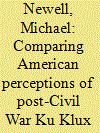

|
|
|
|
|
| Summary/Abstract |
Recently, public debates have questioned whether or not the American government responds differently to terrorism by white, right-wing, Americans. This article examines a historical period in which similar dynamics were on display in state responses to the Reconstruction-era Ku Klux Klan (KKK), Irish-American Fenians, and anarchists from 1860 to 1920. This history suggests that political officials responded to these groups more on the basis of ideas than their actual levels of violence, including discourses of Americanism shaped by ideology, nativism, and racism. Successful claims to ‘Americanism’ lent the KKK a sense of familiarity that led it to be seen as less of a threat to ontological security, even as it posed a significant threat of physical violence. In contrast, the ideologically subversive and foreign anarchists were responded to more severely, despite being responsible for far fewer deaths and injuries than the KKK. This history suggests that American counter-terrorism has been influenced by factors of racial and national belonging in the past, and provides significant context for the consideration of current debates about responses to right-wing groups.
|
|
|
|
|
|
|
|
|
|
|
|
|
|
|
|
| 9 |
ID:
132321
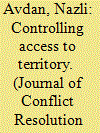

|
|
|
|
|
| Publication |
2014.
|
| Summary/Abstract |
Previous scholarship has largely failed to address the effect of economic interdependence on issue areas other than interstate conflict. This study seeks to redress this lacuna by focusing on states' visa policies and examining the impact of trade and capital interdependence in the context of transnational terrorism. The article argues that economic ties affect visa policies through a reconfiguration of preferences and the opportunity costs of economic loss and by tempering the impact of terrorism. To support this claim, the study conducts statistical analysis using directed dyad data on the visa policies of 207 states and independent political units. The article shows that the impact of economic interdependence is contingent on whether states are directly targeted in attacks of terrorism or face indirect threats from global terror. The study finds that economic incentives overwhelm security concerns when threats are indirect but have relatively limited influence, given threats against a state's own citizens or territory.
|
|
|
|
|
|
|
|
|
|
|
|
|
|
|
|
| 10 |
ID:
131367
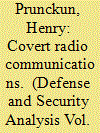

|
|
|
|
|
| Publication |
2014.
|
| Summary/Abstract |
Covert operations by underground groups, such as transnational terrorists, are not new and neither are the methods members of these groups use to communicate in their shadowy world. In this regard, one of the enduring myths is that the main means these covert operatives use to communicate within their cell structure are telephones and emails in their various manifestations. This article critically discusses the possible use of wireless transmissions by transnational terrorists as a reliable form of communications. To critically discuss this proposition, a force field analysis was used to assess the theory that radio is a viable option. Implications of this study's findings are considered in terms of the ramifications they have for defence and security policy.
|
|
|
|
|
|
|
|
|
|
|
|
|
|
|
|
| 11 |
ID:
092049


|
|
|
|
|
| Publication |
2009.
|
| Summary/Abstract |
This article takes a closer look at the relationship between democracy and transnational terrorism. It investigates what it is about democracies that make them particularly vulnerable to terrorism from abroad. The authors suggest that states that exhibit a certain type of foreign policy behavior, regardless of their regime type, are likely to attract transnational terrorism. States that are actively involved in international politics are likely to create resentment abroad and hence more likely to be the target of transnational terrorism than are states that pursue a more isolationist foreign policy. Democratic states are more likely to be targeted by transnational terrorist groups not because of their regime type per se but because of the type of foreign policy they tend to pursue. The empirical analysis provides support for the argument.
|
|
|
|
|
|
|
|
|
|
|
|
|
|
|
|
| 12 |
ID:
105229
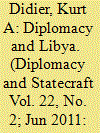

|
|
|
|
|
| Publication |
2011.
|
| Summary/Abstract |
The international community's March 2011 military intervention in Libya contrasts sharply to its reluctance during the preceding forty years to halt the Qadhafi regime's sponsorship of transnational terrorism and pursuit of WMD. American diplomacy, eventually supported by international sanctions, was a four decade effort to end Qadhafi's violent foreign policy. This commentary discusses how diplomacy and the American judicial process combined to achieve this successful outcome. Diplomatic and legislative efforts to compel Libya's payment to terrorism victims helped create judicial remedies enforceable in US Courts and ultimately, a bilateral claims settlement agreement that, while disappointing to the terrorism litigants, normalized relations between the Libya and the United States.
|
|
|
|
|
|
|
|
|
|
|
|
|
|
|
|
| 13 |
ID:
074827
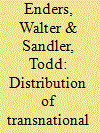

|
|
|
|
|
| Publication |
2006.
|
| Summary/Abstract |
This article applies an autoregressive intervention model for the 1968-2003 period to identify either income based or geographical transference of transnational terrorist events in reaction to the rise of fundamentalist terrorism, the end to the Cold War, and 9/11. Our time-series study investigates the changing pattern of transnational terrorism for all incidents and only those involving U.S. people and property. Contrary to expectation, there is no evidence of an income-based post-9/11 transfer of attacks to low-income countries except for attacks with U.S. casualties, but there is a significant transference to the Middle East and Asia where U.S. interests are, at times, attacked. We also find that the rise of fundamentalist terrorism has most impacted those regions-the Middle East and Asia-with the largest Islamic population. The end to the Cold War brought a "terrorism peace dividend" that varies by income and geography among countries. Based on the empirical findings, we draw policy recommendations regarding defensive counterterrorism measures.
|
|
|
|
|
|
|
|
|
|
|
|
|
|
|
|
| 14 |
ID:
061487
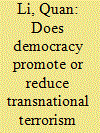

|
|
|
| 15 |
ID:
160212
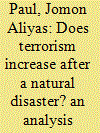

|
|
|
|
|
| Summary/Abstract |
Does an emergency such as a natural disaster lead to a surge of terrorism? This paper contributes to the emerging literature on this issue. We consider the experience of 129 countries during the period 1998–2012 to determine the effect of a natural disaster on both domestic as well as transnational terrorism. We also control for endogeneity using expenditure on health care and land area in a country as instruments. In contrast to the existing literature, we measure the extent of terrorism by the value of property damage. The results indicate that after natural disasters, (a) transnational terrorism increases with a lag, and (b) a statistically significant impact on domestic terrorism is not observed.
|
|
|
|
|
|
|
|
|
|
|
|
|
|
|
|
| 16 |
ID:
052178
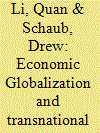

|
|
|
|
|
| Publication |
April 2004.
|
| Summary/Abstract |
The effect of economic globalization on the number of transnational terrorist incidents within countries is analyzed statistically, using a sample of 112 countries from 1975 to 1997. Results show that trade, foreign direct investment (FDI), and portfolio investment have no direct positive effect on transnational terrorist incidents within countries and that economic developments of a country and its top trading partners reduce the number of terrorist incidents inside the country. To the extent that trade and FDI promote economic development, they have an indirect negative effect on transnational terrorism
|
|
|
|
|
|
|
|
|
|
|
|
|
|
|
|
| 17 |
ID:
069234
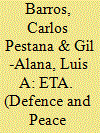

|
|
|
| 18 |
ID:
069054
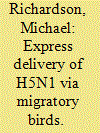

|
|
|
| 19 |
ID:
061769
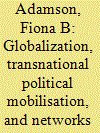

|
|
|
|
|
| Publication |
Apr 2005.
|
| Summary/Abstract |
This article examines how globalisation processes provide new incentives and opportunities for non-state political entrepreneurs to build transnational political movements. Drawing on the literatures on non-violent social movements and transnational networks, the article examines terrorism and political violence as components of the ‘repertoires of contention’ used by radical transnational groups seeking political change. Examples from both the pre- and post-9/11 periods are provided, and the implications for traditional models of state security are discussed. The article concludes by contending that the combination of increased levels of globalisation and the emergence of new networks of violence is creating a fundamental shift in the international security environment, in which the distinction between internal and external security threats is increasingly blurred. While state security strategies are reflecting these changes, less attention has been paid to the political implications of these changes. New security responses need to also be matched by new sets of political strategies at the global level.
1 Versions of this article were presented at the Workshop ‘Globalisation and Security’, Olin Institute for Strategic Studies, Harvard University, Cambridge, MA, 14–16 November 2003 and at the 45th Annual Convention of the International Studies Association, Montreal, 17-20 March 2004. The author wishes to thank Nora Bensahel, Jonathan Kirshner, Sean Lynn-Jones, participants at the Olin workshop and two anonymous reviewers for their helpful comments.
|
|
|
|
|
|
|
|
|
|
|
|
|
|
|
|
| 20 |
ID:
178211
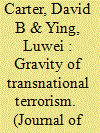

|
|
|
|
|
| Summary/Abstract |
Transnational terrorism is an inherently international phenomenon as it involves attacks where the perpetrators are from a different country than the victims. Accordingly, a growing literature explains patterns in transnational attacks with a focus on international variables, for example, the presence of a border wall or alliance patterns. Despite the importance of the topic, no common empirical framework with theoretical basis has emerged to analyze the flows of transnational attacks. We propose that recent versions of the structural gravity model of transnational flows, long the workhorse model in trade economics, can be modified to provide a theoretically motivated model of the flows of transnational terrorist attacks among countries. The gravity model provides several empirical advantages for the study of international variables and transnational terrorism, for example, recent specifications allow the researcher to estimate count models that condition out all time-varying country-level confounders with fixed effects. This facilitates sidestepping the typical problem that any international variables associated with transnational flows are often correlated with omitted or imprecisely measured domestic factors, which draws their estimates into question. Moreover, we demonstrate that the structural gravity model does a much better job in predicting outcomes, particularly when multiple attacks flow across borders.
|
|
|
|
|
|
|
|
|
|
|
|
|
|
|
|
|
|
|
|
|